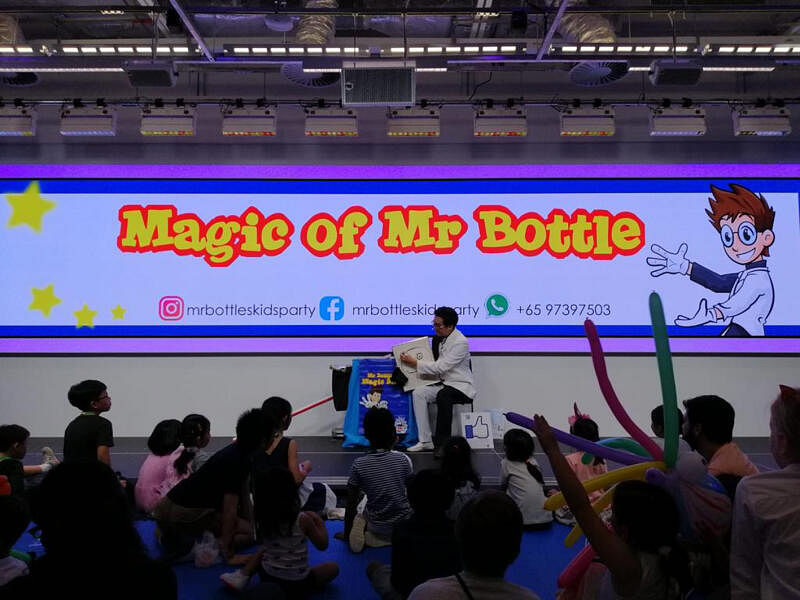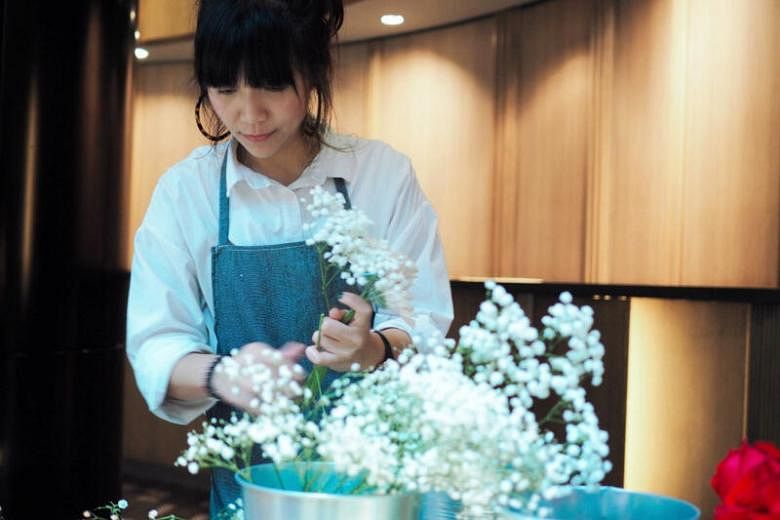SINGAPORE - Survival has become the primary concern for many small and medium-sized enterprises (SMEs) here as they struggle to keep afloat amid the economic fallout from Covid-19.
While some owners have begun frantically diversifying business offerings to find new sources of revenue, others have taken on odd jobs to make ends meet.
Florist Pang Hui Ya, who co-owns 7pm Bloom, typifies the life-and-death challenges being faced by thousands of enterprises across the island.
She told The Straits Times that turnover has fallen by around 80 per cent owing to a series of wedding cancellations in recent months.
"The bulk of our business comes from doing floral arrangements for weddings, so during the circuit breaker period, we focused more on selling ready-made bouquets, but the revenue from that barely covers our costs," added Ms Pang, 30.
Even demand spikes for Mother's Day failed to cover rent and staff costs, she noted.
The business also encountered other hurdles, from unsuccessful applications for government grants and financial aid to losing its rented store space - setbacks that have forced Ms Pang to dig into her savings and take on part-time jobs to make ends meet.
But the business is now getting back on its feet again with a new store space at Oxley BizHub and demand gradually picking up with more wedding ceremonies.
Ms Pang hopes that the looser safe-distancing measures - 50 people can now attend weddings - will translate into revived demand in the coming months.
In the meantime, she is also looking at diversifying by holding floral arrangement classes and rolling out do-it-yourself flower jars.
Businesses in the service sector expect conditions to worsen over coming months, according to recent surveys by the Economic Development Board and Department of Statistics.
Some business owners are now focused on riding out each month as it comes.
Revenue at Mr Rudy de Rozario's event support company Drape Empire plunged by around 90 per cent after almost all events were cancelled.
The firm, which sets up drapes and backdrops for events like concerts and corporate functions, qualified in the 75 per cent bracket of monthly wage payouts as part of the Job Support Scheme (JSS) for its four employees.
But Mr de Rozario, 43, is hesitant about being too overly reliant on financial aid for survival: "The payouts are only able to last us up till October, and with other costs to bear like monthly rent, so we need to pivot into other areas for income, to ensure our month-to-month sustainability until our business picks up pace again."
The company has taken on two technical installation projects recently as well as odd jobs like e-commerce deliveries to make ends meet.
Singapore Business Federation chief executive Ho Meng Kit noted that "micro and small enterprises with more limited resources are adversely affected compared to larger companies", though the JSS has helped them meet cash flow and cost challenges, especially during the circuit breaker period.
He added that the Government had adjusted JSS payouts to support qualified shareholder-directors in addition to employees, recognising that many of them are from small businesses.
However, Mr Wee Kien Meng, who co-owns party planner Mr Bottle Kid's Party, found himself ineligible for JSS payouts, as his business was registered as a limited liability partnership, meaning that he draws monthly income as a "freelancer", not as a shareholder-director.

He was also ineligible for the self-employed income relief scheme despite the firm's revenue falling almost 95 per cent.
Mr Wee, 42, moved the business into the digital realm after a series of party cancellations from March to July.
He now offers discounted packages such as online magic shows, workshops and decoration kits but customers have not responded as well as he had hoped.
"Though we are getting small successes from these strategies, the revenue is nowhere close to what we used to have, as parties are typically held in large numbers and some parents are not as keen to do virtual parties for their kids," Mr Wee said.
Mr Kurt Wee, president of the Association of Small and Medium Enterprises, said that while continued government support is essential in helping SMEs cut costs and increase revenue, funding should be directed at businesses that would still be viable even beyond the Covid-19 pandemic.
This means firms must thoroughly assess their own "developmental potential, taking into account the industry and sector that they are in, and whether the business itself has strong fundamentals", he noted.
"Once this has been established, businesses can then consider how they can diversify and grow their revenue streams amid Covid-19, taking into account the cost components and the government support schemes they are eligible for."
This "will help them come up with a plan - which should last at least up till the end of 2021 - on how they can tide through this Covid-19 period".


